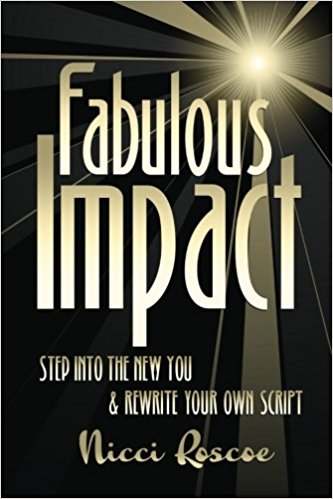Grant Leboff: So Nicci. When you read your book, 'Fabulous Impact' it's almost impossible to not be taken with your story, which is sort of the inspiration behind the book, so perhaps that's a good place to start is just understanding a little bit about your story and how you got to this book?
Nicci Roscoe: So in 2001, I discovered I had a brain tumour. I was working, things were great. Just before that I was head of the David Lloyd club UK for aerobics, having a great time. I was regularly working on television as a health and fitness presenter and I was looking after teams as well at the David Lloyd clubs. All of a sudden, my coordination started to go and I was out one day and I had the most unbelievable pain in my head. I could barely see, the light was too bright and I lost my speech - little bit difficult to think now that I lost my speech - but I did and I ended up seeing a neurosurgeon. I had an MRI scan and they told me that I had a brain tumour.
My whole life completely changed because it was life threatening. After that, I was determined to make something of myself; to keep going and to inspire other people too. So I trained as a business coach and also a master NLP practitioner which is Neuro Linguistic Programming... How we think, what we say to ourselves and how we apply that. I found that by using that with business leaders and other people in their lives, that really helped to motivate them and inspire them too.
Grant Leboff: So how did you go from what was obviously, a long recovery process. How did you get to a point where you were ready to take on the world again, as you are now?
Nicci Roscoe: It did take a while. It took me a good year to actually start walking and talking again and feeling good about myself. I needed to boost my confidence because my morale was pretty low and I didn't feel so good about myself, because I really needed to get back out there. I wanted to focus on boosting my own confidence by telling myself and talking to myself - 'Nicci you can do this. You can make this happen, the whole world's out there, you can start to think positively' - because there's so much about thinking positively and mindfulness and how we can deal with it. And also, I have had pain in my head so I've got three plates and six screws, one of which is lose - Grant - in my head, I really, genuinely, have a lose screw! It was; What can I do? How can I deal with this?. So I made a decision; I'm going to take control of the pain, I'm going to take control of the speech situation - and it wasn't going to be the other way around. So when I work with my clients it's the same thing in every situation. YOU take control of the situation. Don't allow anyone else to take control of it. And that's exactly what I did and I visualised on how I wanted to see myself, how I wanted to be, what was it that I wanted to do to make those changes, to make those positive changes, so that I could feel better about myself and then get up there and do something.
Grant Leboff: And early in the book, which is one of things I want to talk about. You talk about the power of visualisation. So how did that help you and how do you work with business leaders now, to use the power of visualisation?
Nicci Roscoe: When I'm working with business leaders... for example, I had a client... he wasn't feeling great about himself. He was a business leader but he had some issues that were going on at home. He wasn't feeling particularly good about himself. He'd lost a few deals recently. He was in the financial sector and he did have a team underneath him. They were waiting for him to boost their confidence and rather than him walking around with a face on him and being very moody. So we spoke about it and over about six coaching sessions, six individual sessions, we talked about what it is, and how it is, he wants to see himself, so that he could feel better. We also talked about his achievements and what he has done. It's very important when you're not feeling good about yourself, how you remember what you have achieved in your life. He used to visualise that, he used to think about it. I know people often say 'Well I find visualisation really challenging'.
How do you visualise? Well for instance if you close your eyes, and you can imagine seeing your front door, and then your door knocker and the door bell and ringing the door bell and opening the front door and walking through it, what is it you see in your hall? That's visualisation. I usually get someone to do something very simple, like that. Then close their eyes and think about what it is they have achieved, what it is they have done, and step back into that time. Then start thinking about what it is they now want to achieve and what it is they're going to do. It's by looking forward and by doing that, that starts to boost one's confidence, they start to feel better, and with this particular client, he felt so much better that he started to put smile on his face with his teams and I actually ended up working with his team as well. So that was really great.
Grant Leboff: And how long did it take you think for visualisation to have a positive effect? How long does someone have to use this technique to start reaping the benefits of it?
Nicci Roscoe: I would say when you first start doing it, you might find it a little bit challenging. The first time that you ever do it. The more frequently you do it... if I said to you, every morning you wake up, I'd really like to visualise you're going to have a really great day. See the day you're going to have, see what you've got in front of you, the meetings you've had, what's happening in the boardroom or you're going to have lunches or you've got a dinner planned visualise that and how well you want to see that going. Visualise how you're going to be talking to your team and what it is you're going to say, and how you want them to react. And don't just do it when you wake up in the morning, do it again as you're going on your way to work. Keep doing it because it's practice. Practice makes it happen. There's no point in doing something and... It's like - say you go to the gym and you're going to do a workout. If you went to the gym once and you said you wanted to get some nice strong muscles and you want it to really work your legs, would you get the results after doing it only once? No. So you need to spend that time, you need to spend a good few weeks, to start thinking; oh, I feel better now. I feel more energy, I feel more confident, look at my body it's feeling better. It's the same with visualisation, you need to practice it, you need to do it regularly to get those results.
There may be small changes to the spoken word in this transcript in order make it more readable.


